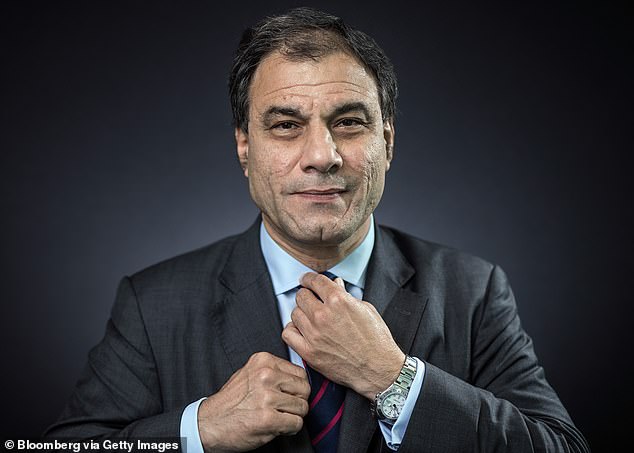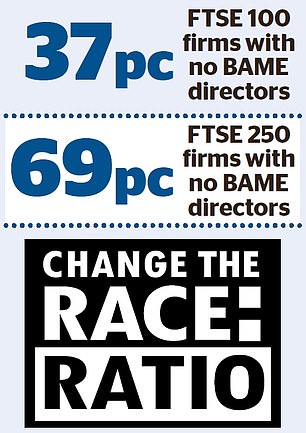Race for change: CBI’s first ethnic minority president spearheads new drive to make FTSE 350 boardrooms more diverse
A new drive to increase the numbers of black, Asian and ethnic minority directors sitting on the boards of UK companies is being launched today.
The initiative is being spearheaded by Lord Bilimoria, the first ethnic minority president of employers’ organisation the CBI in its 55-year history.
It comes as the British-Indian peer, who was a staunch Remainer, says he had been subjected to ‘aggressive and open’ racism over Brexit.

Lord (Karan) Bilimoria, best known as the founder of Cobra beer, is the first ethnic minority president of employers’ organisation the CBI in its 55-year history
Raising the numbers of black, Asian and ethnic minority (BAME) bosses is one of Bilimoria’s top priorities at the CBI.
The 58-year-old crossbencher, best known as the founder of Cobra beer, is modelling his campaign on the 30 Per Cent Club which has successfully battled to get more women into boardrooms.
Called ‘Change the Race Ratio’, it has set a target for at least one racially and ethnically diverse board member at every FTSE 100 company by the end of next year and at every FTSE 250 firm by 2024.
Signatories include Aviva, the insurance giant, US tech behemoth Microsoft, head hunter Russell Reynolds and law firm Linklaters.
Subscribers to the campaign commit themselves to transparent reporting on ethnic representation at senior levels and to revealing their ethnic pay gap by 2022.
Lord Bilimoria said he had begun work on his campaign long before the Black Lives Matter protests that swept the country in the summer.


‘Change the Race Ratio’, wants at least one racially and ethnically diverse board member at every FTSE 100 firm by the end of next year
He said the only discrimination he had ever suffered was around the time of the EU referendum and the acrimony that followed.
‘Through the Brexit days, I received some really, really bad racism,’ he said. ‘There were really aggressive people telling me to go back to where I came from and some much worse, so bad that I cannot even repeat it to you. Other than that I have never been affected personally.’
He added that this country had transformed dramatically in the past 40 years. ‘I came to the UK as a 19-year-old student from India in the 1980s and it is a very different country now,’ he said.
‘People warned me back then that, ‘You will never get to the top as a foreigner, there will be a glass ceiling’, and I’m afraid to say at that time, they were right.
‘Now it has totally changed. This country wouldn’t be the sixth largest economy in the world without the contribution of ethnic minorities.’
Firms with diverse boards outperformed those that did not, he claimed, adding: ‘The business case is well proven.’
On the question of how firms should address any historic links with the slave trade, such as pubs group Greene King or Lloyd’s of London, he said: ‘It is very important to be aware and open about your history but it is what you do today that matters.’
A review by industrialist Sir John Parker found fewer than 7 per cent of FTSE 350 directors are from BAME backgrounds.
Separately, a report by Baroness McGregor-Smith, a former boss of outsourcing firm Mitie, found that dismantling barriers in the workplace so that BAME workers can get ahead could boost the economy by £24billion a year.
The theory is that companies with diverse leadership teams are better able to understand and cater for their customers. It is also believed they are less likely to suffer mistakes made through ‘group think’ than those run solely by middle-aged, middle-class white men.
A government-backed drive to get more women on boards has hit its target of a third of FTSE 100 directors. That is up from less than 12.5 per cent a decade ago.
Carolyn Fairbairn, the CBI’s first female director general, has championed ethnic pay reporting.
Ethnic pay reporting is likely to be modelled on the gender gap rules.
These require firms with more than 250 staff to calculate and publish the average salary and bonus figures for men and women. The gender statistics revealed that men are paid significantly more than women.
Evidence suggests BAME employees are paid substantially less well than their white British equivalents.
A study by the Resolution Foundation think tank found they are missing out on £3.2billion a year of pay compared with white colleagues.
The foundation revealed the pay gap was as high as 17 per cent for black male graduates.
